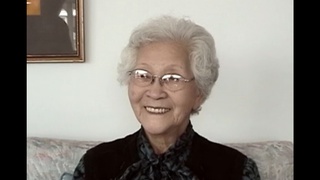Interviews
Food preparations for Keirokai
They have months planning of it, and they say to the smallest details who's going to decorate the room, and for example, they serve an ozoni, or some soup. I think maybe it's miso, maybe it's just miso but it has what they call a mitsuba that they put a little leaf that has the three petals, there are three leaves, and they have to be tied in a ribbon. And so before... I think it needs to be planted, or trimmed, I don't know 15 days before so when the leaves are the right size to be harvested, and served in the soup.
So stuff like that logistically, they've been working about who's buying the shiitake that goes in the stew, or the seaweed for the wraps, whatever it is they work months, and they have a spreadsheet already, and the list of tasks, and everything. But that is usually organized, the food is cooked by the fujin-bu, it's a group of females. And that's what they pride themselves that they're serving them food that specially all Japanese, or as Japanese as we can make it with whatever we have available in Colombia.
Date: September 22, 2019
Location: California, US
Interviewer: Yoko Nishimura
Contributed by: Watase Media Arts Center, Japanese American National Museum












